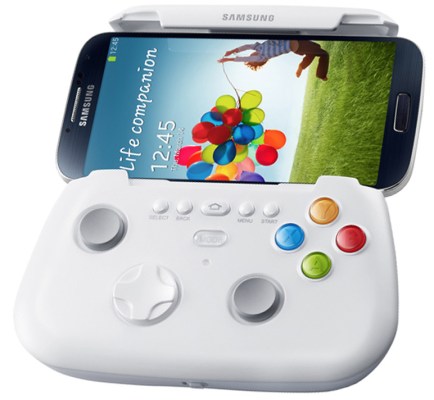Look, we’ve all heard the rumors that Google is toiling away on a smartwatch, and the company has said the Nexus Q isn’t completely dead, so part of that recent report from the Wall Street Journal doesn’t completely out of the blue. That said, Google is reportedly also working on an Android-powered game console in response to murmurs of a similar Apple gaming push in the works.
Pretty ballsy, if you ask me.
We can’t know for sure how good Google’s intuition is when it comes to Apple’s gaming ambitions, but the folks in Cupertino are clearly looking at gaming with some level of interest — iOS 7 includes improved support for game controllers, and was at one point rumored to be working on its own controller hardware.
As the past few weeks have illustrated nicely though, there’s plenty of jostling among established gaming companies as they attempt to lay claim to our living rooms, and yet Google apparently wants to throw itself headlong into the fray. In light of this potential hardware push, Google Play game services doesn’t just look like a shot across Apple Game Center’s bow — it’s a way for developers to create Android games with that incorporate some of the features that console gamers have all but taken for granted at this point.
If this information pans out and Google does release an Android-powered console at some point in the near future, the company’s problem isn’t just the pressure it faces from entrenched players like Sony, Microsoft, and even Apple. The past year has seen plenty of upstart hardware companies attempting to shoehorn Android into tiny little packages with tiny price tags, and with varying levels of success.
One of those ambitious little doodads garnered more attention than the rest — it’s damned near impossible to think the words “Android game console” and not follow up with “Ouya.” Hell, Amir Efrati’s WSJ report points out that Google has been paying particularly close attention to the Kickstarted startup, which guided its namesake device to a retail launch earlier this week after spending the past few months shipping pre-release versions to backers and developers. The Ouya temporarily sold out on Amazon, and it’s still backordered on Best Buy’s website — not too shabby, considering its unabashedly geeky pedigree.
At this point it’s tough to say whether that’s a result of extreme demand for the $99 console or just limited supplies, but either way it seem as though a decent chunk of people have been waiting for this. That said, the company is awfully cagey on what it specifically hopes to get out of this retail push. During a recent chat CEO Julie Uhrmann wouldn’t disclose how many units would need to be sold at retail for her to consider the Ouya successful — she instead responded with platitudes about how she wanted Ouya to be available to everyone to wanted one.
Uhrmann also said that she didn’t want anyone on the team even thinking of Ouya 2.0 until this current model has established a foothold in the market. It’s a curious thing to hear from the head of company that will probably live and die based on the strength of its annual hardware refreshes. The incentive is there to keep iterating and iterating and iterating until the Ouya succeeds — is Google (or whatever hardware partners it may tap) prepared to do the same?
And all that said, early reactions of the Ouya have been a mixed bag. I’ve been fiddling with an Ouya myself for the past few days, and though a full review is forthcoming, my first impressions can essentially be summed up with a single syllable: meh. And the Ouya is just one example — now there are GameSticks and Gamepops and MOJOs, to say nothing of a whole host of Shenzhen specials. Sony and Microsoft have the top-end well accounted for, and the race to the bottom for Android gaming in the living room has already begun.
So, when it comes down to it, can Google really crack the game console market? It’s possible, sure. Google may just be able to use its resources and developer clout to carve out a niche in a stupendously crowded gaming environment. It’s also worth noting that video game history is littered with the carcasses of dead, ill-conceived consoles, consoles that had great controllers, great games, and even net connectivity ahead of their time. The lesson to be learned from those dusty heaps of plastic is that (sadly) innovation is no guarantee of success, so Google is going to have to be terribly, terribly clever if it wants to have any lasting impact in our living rooms.
